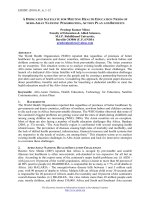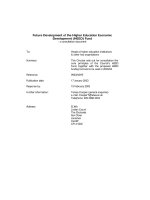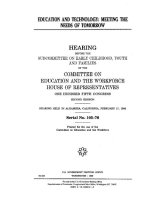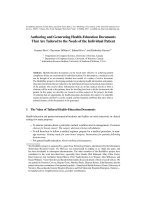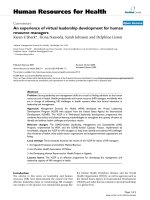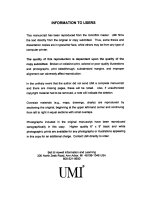Identifying Leadership Development Needs of Catholic Secondary Ed
Bạn đang xem bản rút gọn của tài liệu. Xem và tải ngay bản đầy đủ của tài liệu tại đây (2.7 MB, 191 trang )
Walden University
ScholarWorks
Walden Dissertations and Doctoral Studies
Walden Dissertations and Doctoral Studies
Collection
2016
Identifying Leadership Development Needs of
Catholic Secondary Educators
Neil M. Theisen
Walden University
Follow this and additional works at: />Part of the Educational Administration and Supervision Commons
This Dissertation is brought to you for free and open access by the Walden Dissertations and Doctoral Studies Collection at ScholarWorks. It has been
accepted for inclusion in Walden Dissertations and Doctoral Studies by an authorized administrator of ScholarWorks. For more information, please
contact
Walden University
COLLEGE OF EDUCATION
This is to certify that the doctoral study by
Neil Theisen
has been found to be complete and satisfactory in all respects,
and that any and all revisions required by
the review committee have been made.
Review Committee
Dr. Don Jones, Committee Chairperson, Education Faculty
Dr. JoeAnn Hinrichs, Committee Member, Education Faculty
Dr. Paul Englesberg, University Reviewer, Education Faculty
Chief Academic Officer
Eric Riedel, Ph.D.
Walden University
2016
Abstract
Identifying Leadership Development Needs of Catholic Secondary Educators
by
Neil M. Theisen
MAT, Fordham University, 1996
BA, Fordham University, 1995
Doctoral Study Submitted in Partial Fulfillment
of the Requirements for the Degree of
Doctor of Education
Walden University
August 2016
Abstract
Current administrators at a Northeast metropolitan area Catholic school have not formally
identified the needs that support leadership development for their future and novice
administrators. Compounding this problem, an increasing number of Catholic school lay
administrators are taking on leadership roles traditionally held by members of religious
communities whose membership is steadily declining within the United States. This case
study examined the experiences of current administrators to identify leadership
development needs for novice and future administrators at a Catholic secondary school.
The study’s framework was derived from the concepts of leadership succession planning
and mentoring. A purposeful sample of 10 current lay administrators at a Catholic
secondary school was used to provide interview data in response to standardized
questions designed to elicit their perceptions. An inductive approach was used to analyze
the data through the identification and coding of common themes that emerged from the
range of participant responses. The findings demonstrated that active leadership planning,
purposeful mentoring, and prioritizing the continuity of religious identity were critical
needs for the development of novice and future administrators at the particular
metropolitan Catholic school in question. The findings may be used to codify the
leadership development process at the research site and to provide a model for other
Catholic secondary schools to develop administrator preparation programs that address
common leadership requirements for the future.
Identifying Leadership Development Needs of Catholic Secondary Educators
by
Neil M. Theisen
MAT, Fordham University, 1996
BA, Fordham University, 1995
Doctoral Study Submitted in Partial Fulfillment
of the Requirements for the Degree of
Doctor of Education
Walden University
August 2016
Dedication
To my wife Joanne.
Acknowledgments
I would like to thank my committee chairperson, Dr. Don Jones, for staying with
me over the course of this long journey. His mentorship and patience were invaluable.
I would also like to thank my committee members, Dr. Englesberg, Dr. Hinrichs
and Dr. Miller…Their dedication kept me from settling for less than my best effort.
Thanks to my mom for teaching me the value of education.
Thank you to my children for understanding the hours spent pursuing this study.
Most of all, thank you to my wife Joanne…without her love and support the first
page would still be blank.
Table of Contents
List of Tables……………………………………………………………………………...v
Section 1: Introduction to the Study ....................................................................................1
Problem Statement .........................................................................................................4
Nature of the Study ........................................................................................................6
Research Question .........................................................................................................7
Purpose of the Study ......................................................................................................8
Conceptual Framework ..................................................................................................8
Operational Definitions ................................................................................................12
Assumptions, Limitations, Scope, and Delimitations ..................................................13
Assumptions.......................................................................................................... 13
Limitations ............................................................................................................ 13
Significance of the Study .............................................................................................14
Summary ......................................................................................................................15
Section 2: Literature Review .............................................................................................17
Overview ......................................................................................................................17
Need for the Study .......................................................................................................18
Leadership and Education ............................................................................................21
Leadership Development Experiences .................................................................. 25
Need for Leadership Development ....................................................................... 27
Evolution of Educational Leadership.................................................................... 30
Need to Develop a Leadership Vision .................................................................. 33
i
Models of Leadership Development Programs..................................................... 34
Need for Leadership Development in Catholic Parochial Schools ..............................36
Changing Nature of Catholic Parochial Faculty Demographics ........................... 40
Challenges Facing Lay Leadership ....................................................................... 42
Identifying, Encouraging, and Developing Future Leaders .................................. 44
Sustainable Leadership ................................................................................................46
Grooming as a Function of Leadership ................................................................. 48
Succession Planning Through Leadership Development ..................................... 50
Internal Leadership Development Programs ........................................................ 53
Organizational Experience and Leadership Development .................................... 54
Organizational Benefits of Internal Leadership Development ............................. 56
Negative Effects Associated With the Lack of Leadership Development
Programs ................................................................................................... 58
Literature Related to the Methodology ........................................................................61
Conclusion ...................................................................................................................67
Section 3: Methodology .....................................................................................................68
Research Design...........................................................................................................68
Design Justification ............................................................................................... 70
Research Question .......................................................................................................75
Context of the Study ....................................................................................................76
Participants ...................................................................................................................77
Ethical Issues ...............................................................................................................80
ii
Role of the Researcher .................................................................................................81
Data Collection ............................................................................................................81
Data Analysis ...............................................................................................................83
Validity ........................................................................................................................86
Conclusion ...................................................................................................................87
Section 4: Findings ............................................................................................................89
Interview Data Collection ............................................................................................89
Artifact Data Collection ...............................................................................................94
Interview Data and Themes .........................................................................................94
Artifact Data and Themes ..........................................................................................100
Findings......................................................................................................................103
Administrator Preparation Experiences .............................................................. 106
Institutionally Specific Administrator Challenges .............................................. 111
Administrator Preparation Philosophies ............................................................. 117
Institutionally Specific Administrator Requirements ......................................... 123
Other Themes ...................................................................................................... 127
Summary of the Findings ...........................................................................................129
Validation ...................................................................................................................135
Summary ....................................................................................................................137
Section 5: Interpretations, Implications, and Recommendations.....................................138
Interpretation ..............................................................................................................139
Administrator Preparation Experiences .............................................................. 140
iii
Institutionally Specific Administrator Challenges .............................................. 141
Administrator Preparation Philosophies ............................................................. 142
Institutionally Specific Administrator Requirements ......................................... 143
Implications for Social Change ..................................................................................147
Recommendations for Practice ..................................................................................149
Recommendations for Further Study .........................................................................151
Reflection ...................................................................................................................152
Conclusion .................................................................................................................153
References ........................................................................................................................155
Appendix A: Primary Research and Interview Questions ...............................................172
Appendix B – Job Descriptions from Faculty Handbook ................................................174
iv
List of Tables
Table 1. Weight of Thematic Passages Per Typology…………………………………...98
Table 2. Frequency of Emerging Thematic Passages Coded Against Each Typology…..99
NO TABLE OF FIGURES ENTRIES FOUND.
v
1
Section 1: Introduction to the Study
The Catholic parochial school system in the United States is at a crossroads. The
administrative model that has been in place for more than a century has traditionally
relied on members of religious communities to fill leadership positions. This paradigm
may no longer be viable, considering the steep decline in the present membership of
those same religious communities. In referencing American nuns, Gibson (2014) stated
that “membership in women’s religious orders grew rapidly in the first half of the 20th
century, reaching a high point of 181,421 sisters in 1966. Since then, the numbers have
steadily declined, to below 50,000 today, a 72.5 percent drop-off” (para. 2).
As a result of this demographic change, lay faculty in the Catholic school system
have experienced an expanded role in the area of classroom teaching and, more recently,
in school administration. These circumstances are becoming more common across the
broad spectrum of Catholic schools in the United States, and they raise the question about
the need for formal and informal professional leadership development programs for
future school administrators (McDonald & Schultz, 2016).
No evidence has been found to suggest that Catholic schools in the United States
have invested in internal administrator preparation programs on a significant scale.
Formal, uniquely organized and sponsored administrative leadership development
programs in schools have existed for many years. At least one large metropolitan school
district in the United States and the national school system in Great Britain have
2
developed internal leadership programs for administrators that offer more than basic
academic credentials available through degree granting programs. The New York City
Department of Education (NYCDoE) has established a leadership academy to equip
aspiring principals with foundational professional leadership development. The 14-month
program “uses problem-based and action learning methodology to prepare participants to
lead instructional improvement efforts” (NYCDoE, 2010, p. 1). The Aspiring Principals
Program (APP), which was instituted in 2004, currently accounts for 16% of New York
City’s public school principals and provides leadership coaching programs tailored to
meet specific leadership challenges (NYCDoE, 2010). On a broader scale, Great Britain
recently moved toward providing baseline leadership development programs that go
beyond formal academic degrees at the national level. The National College for School
Leadership in Great Britain, which opened in 2002, offers standardized national level
leadership development, to include the exploration of emerging practices (Bush, Briggs,
& Middlewood, 2006). Both the New York City program and the British national
program underscore the fact that focused leadership development beyond obtaining a
formal academic degree is important to the success at the individual institutional level.
Focusing on a smaller scale by studying the problem at a metropolitan area
Catholic school in the Northeast United States, I explored school community and
organizational needs that drive leadership development centering on administrator
preparation at this local level. Over the past few decades, U.S. Catholic schools have
been challenged to remain a competitive alternative to an improving and evolving
3
national public school system. In the Northeast United States, Catholic schools that had
once been filled with hundreds of students have either closed or consolidated into
regional schools (Lestch, 2011). To justify substantial tuition expenditures by
stakeholders, Catholic schools need to remain competitive while maintaining the
religious and cultural traditions that make them the preferred choice for individuals
choosing a faith based education. At the same time Catholic schools must keep pace with
nonreligious, private and public institutions to meet the current and future needs of their
students.
Remaining a competitive educational choice is essential for the survival of any
private educational institution. To this end, leadership is critical. Catholic stakeholders
should consider leadership development programs for future administrators who, because
of the increasing shortage of faculty from religious orders, will likely emerge from the
ranks of lay faculty. Future leaders must understand the enduring mission of Catholic
schools and their evolving role in the surrounding communities. This paradigm shift
coincides with the model of participative leadership in which faculty members are
prepared to assume leadership and administrative roles within the decision-making
process of an educational institution (Lunenberg & Ornstein, 2008). Few, if any, studies
have focused specifically on community and organizational needs that will shape
leadership development for administrators in Catholic education.
4
Problem Statement
The community of current administrators in a Northeast metropolitan area
Catholic school had not formally identified the needs, both organizational and communal,
that support leadership development for future and novice administrators. At the Catholic
school in question, there was no published record of any formal discussion, at either the
administrative or general faculty level, that addressed leadership development for
aspiring administrators. This problem was compounded by the sharply and steadily
declining numbers of religious faculty who traditionally held administrative positions and
were responsible for maintaining the religious identity of Catholic schools in the United
States (Gibson, 2014). Through interviews, I explored the perceptions of current
administrators at one metropolitan Catholic secondary school regarding the need for
leadership development programs.
This problem is not unique to the school in question: Catholic schools across the
United States are being affected by the declining numbers of religious orders, particularly
Catholic schools in Northeast metropolitan areas of the United States. A large number of
Catholic schools are located in this region, and they will soon be at a point of
organizational transition resulting from the decline of religious faculty and
administrators. Historically, individuals from various religious communities held school
leadership and administrative positions in U.S. Catholic schools. These religious
communities were assigned to or sponsored educational institutions (Dolan, 2010). The
current trend is for lay faculty to assume more responsibility for classroom teaching and
5
school administration (Editorial, 2005; Scheopner-Torres, 2011). Despite this trend, no
evidence has indicated that professional leadership programs for administrator
preparation exist in response to specifically identified needs arising from the local school
community. There is evidence, however, that public school systems in comparable
metropolitan region have instituted leadership development programs in response to
school community and organizational change (NYCDOE, 2010).
The contemporary dynamic educational environment is complex. Classroom
experience alone may no longer provide the foundational depth required of most school
administrators. Being a good teacher does not automatically prepare an educator to be a
good department chairperson or a good administrator. Teaching qualifications and
experience are no longer considered sufficient to hold leadership positions; leadership at
the administrative level is more commonly being considered a more specialized position
requiring specific preparation (Bush, 2008). Outside of the Catholic school system, future
program directors, department chairs, and administrators require formal and informal
leadership development through their educational institutions that supplements
certificate- or degree-granting academic programs (Miller, 2008; Rhodes & Brundrett,
2009; Vasudeva, 2009).
Each school has unique organizational and instructional needs specific to its
relationship with the community it serves. The absence of professional leadership
development programs in response to the unique requirements of a local school
community might decrease the perception of faculty efficacy because of the lack of
6
preparation for long-term career advancement opportunities. In a British study, Rhodes
and Brundrett (2009), concluded that the lack of confidence and the limited mentoring
prevented teachers “from actively pursuing or achieving leadership progression” (p. 385).
Rhodes and Brundrett recommended a common-sense approach to education and to
mentoring and career development preparation programs.
Nature of the Study
I employed a constructivist case study methodology to address how to best
prepare the next generation of Catholic leadership not only at the school in question but
also in the larger context of the Catholic school system. The research was timely because
Catholic schools, especially those in the local school community in this study, are
transitioning from a model in which leadership and leadership training is carried out
within sponsoring religious communities to one in which lay faculty will be taking on
more leadership and administrative roles because of the decline of religious community
membership throughout the United States.
I employed a qualitative study to answer the primary research question, which
focused on identifying the needs that will support the establishment of leadership
development programs for parochial school administrators. The literature review
addressed the contextual and methodological foundations and indicated the need for
further study of the problem. Interviews with current administrators at a Northeast
metropolitan area Catholic secondary school were the primary data source. Participants
answered open-ended questions directing them to articulate the various needs that support
7
leadership development for future administrators at the school community. Additionally,
artifacts were collected to provide both context and validation for the interview process.
The data were coded and analyzed for key trends, which led to a greater understanding of
the needs driving leadership development at the school. Recommendations were made
based on how the needs identified by the interviewees may influence leadership
development programs at the participating school.
Research Question
The decline in the number of religious faculty in the U.S. Catholic school system
over the past few decades has created leadership opportunities in administration for lay
teachers (Gibson, 2014; McDonald & Schultz, 2016). Unlike their public school
counterparts, however, most Catholic lay faculty members do not have access to
specialized leadership training in administrative roles. A review of the literature revealed
no specific studies that directly addressed leadership development for future
administrators serving in Catholic secondary schools. Several related works indirectly
supported the research topic. Based on extensive web-based research, I was the first to
address the topic of identifying the needs in a local parochial Catholic secondary school
community that should and will drive leadership development for future administrators.
In case studies, the data paint a picture so that the reader develops an in-depth
understanding of the problem being explored (Creswell, 2007). The basis for defining the
needs that support the use of a leadership training program for future administrators at a
Northeast metropolitan area school can be found in the experiences and perceptions of
8
current administrators. The study was guided by one research question: What needs do
current administrators at one Northeast metropolitan parochial school identify to support
leadership development for novice and future administrators?
Purpose of the Study
The purpose of this study was to gain an in-depth understanding of leadership
preparation needs as identified by current administrators at one Northeast metropolitan
parochial school. Current administrators’ experiences were used to identify the needs that
may guide future leadership development programs. The study focused on the specific
developmental issues of the institution in light of the sharply and steadily declining
numbers of religious faculty who have traditionally held administrative positions in
Catholic schools. Given the limited number of studies on the need for specialized
leadership development training in U.S. Catholic schools, this constructivist case study
addressed the need for specific administrator preparation tailored to the culture and
character of the local school community. The findings were intended to create a basis for
new leadership development programs for administrator preparation and organizational
growth planning at the local Catholic school community.
Conceptual Framework
This study was designed to identify leadership development needs in one
secondary Catholic school through a comprehensive understanding of the phenomena
based on the multiple realities and perspectives created by the interaction between
myself, as the researcher, and the interview participants. Before identifying a need, that
9
need must be defined. In education, the term leadership has taken on many definitions
and has often been confused with the term management. Management addresses the
operational processes of an organization, whereas leadership creates context for the
present and defines the future direction for an organization. Steyrer (1998) wrote about
leadership as a way of expressing values and meaning through action and inspirational
vision. Steyrer’s leadership is transformative; that is, the followers adopt the
organizational values and mission articulated by the leadership. In essence, the
individuals commit to the mission as defined by leadership.
The purpose of this subsection is to define the concept of leadership development
in relation to administrator preparation. This conceptual framework was necessary to
bridge the gap between leadership development in an educational setting and the specific
case of leadership development to prepare administrators in the secondary school I used
in this case study. In addition, understanding the nature and potential benefits of
leadership development programs created a context through which interview responses
were analyzed and the resulting recommendations were presented.
The need for leadership development in a local setting has been identified for
nearly a century. In an early 20th -century work on leadership development for
administrators, Pierce (1935) chronicled the evolution of professional qualifications for
principalship. In the 19th century, principalship culminated in the mastery of academic
subject matter and good character. By the late 1800s, metropolitan school districts,
particularly in the Northeast, began to require professional knowledge on the subjects of
10
teaching, general education, and even educational reform as a qualification. By the early
1900s, principals’ associations began to develop to provide peer-to-peer mentoring in
addressing the challenges of educational leadership. These associations were one of the
first examples of leadership development at the local level, which supplemented formal
academic programs (Pierce, 1935).
The justification for leadership development in response to locally identified
needs remains valid in the current era of educational transformation. Few new principals
have mastered the tenets of administrative management and instructional leadership.
Experienced principals require support to sustain relevant competence in leading a school
community. In response to these needs, leadership development is required in some
school districts, such as in the New York City public school system, regardless of
experience (Fink & Resnick, 2001). Today, few doubt the decision to invest in quality
school leadership; the question is how to produce sustained and responsive quality
leadership in local school communities (DeVita, Colvin, Darling-Hammond, & Haycock,
2007). To this end, strategic planning in leadership succession is critical and requires
deliberate preparation in meeting the needs of the local school community (DeVita et al.,
2007; Lindsay, 2008). Although workshops and seminars are effective introductions to
new leadership concepts, leadership development at the local level provides a sustained
solution in response to trending educational issues at the local level (Darling-Hammond,
LaPointe, Meyerson, & Orr, 2007). A good example of the type of sustained and
responsive local leadership development addressed in this study can be found in the New
11
York Leadership Academy, founded in 2003, whose objective is the preparation of new
principals, beyond academic credentials, for the rigorous demands that a diverse
metropolitan community can impose (DeVita et al., 2007).
When researching this topic, I identified several recurring needs driving local
leadership development. Traditionally, school administrators spent a significant amount
of time managing resources, such as finances, supplies, faculty training, community
relations, and so on. These tasks still put a heavy demand on principals’ time. Effective
leadership development in addressing these challenges can mitigate extra effort spent on
these factors (DeVita et. al., 2007). Another identified need is the current trend in which
school leaders attempt to move away from administrative mechanics. Instead, leaders
focus on instructional leadership, curriculum development, and faculty coaching that
responds to the specific challenges of a local school community (Mendels, 2012). The
need for mentorship has also been a recurring theme in leadership development literature.
In general, U.S. administrators work in a compartmentalized environment (DeVita et al.,
2007). In response to this phenomenon, school districts have been formalizing the
mentoring process, resulting in a continuity of experience in responding to local school
issues (DeVita et al., 2007; Fink & Resnick, 2001).
The majority of concepts discussed in this section were pioneered by metropolitan
area public school systems in response to common leadership challenges applied in
diverse local settings. In this study I applied the above concepts that currently govern
leadership development in multiple metropolitan areas of various sizes across the United
12
States, including the Northeast metropolitan area Catholic school where I conducted the
research. The commonality of the needs that govern the local school community should
not have affected the general application of these concepts; however, the unique religious
nature of a Catholic school may have altered the context of the application to a significant
degree.
Operational Definitions
The following terms are defined according to how they were used in the study:
High-time administrator: An individual who has 20 years or more of experience
in a titled school administrative position. High-time does not refer to a type of
administrator position.
Laity/layperson: Individual who is not considered clergy (Catholic Online, 2013).
Leadership development: A process that enhances the capability of individuals to
act in leadership roles within their school community (BTS, 2013). In the context of this
study, leadership development will be used interchangeably with administrator
preparation or administrator development.
Mid-level administrator: An individual who has 5 years or more, but less than 20
years, of experience in a titled school administrative position. Mid-level does not refer to
a type of administrator position.
Novice administrator: An individual who has less than 5 years of experience in a
titled school administrative position. Novice does not refer to a type of administrator
position.
13
Parochial school: An educational institution supported by a local church or
religious community. The governing principles and financial support are provided by the
local church or religious order, although in most cases students pay tuition to attend the
school (Freude, 1998).
Assumptions, Limitations, Scope, and Delimitations
Assumptions
I assumed that the respondents answered the interview questions accurately and
objectively and without an obligation to adjust their responses to avoid criticizing the
school’s current or previous leadership and policies. I also assumed that the respondents
had a genuine concern in identifying the needs of parochial professional leadership
development, and provided logical and carefully considered responses to the interview
questions. I also assumed that the respondents had both the breadth and depth of
experiences to answer the questions in a manner that would bring about new
understanding of the research topic. Additionally, I assumed that the experiences
recorded at the particular Catholic secondary school where the interviews took place were
common, to a degree, with other metropolitan area Catholic schools. Finally, I assumed
that the respondents’ answers would allow for identification of common themes.
Limitations
One limitation of this study was the relatively modest size of the local school
community in which the research was conducted. The school community is sponsored by
a specific religious order, subsequently narrowing the scope of the organizational culture
